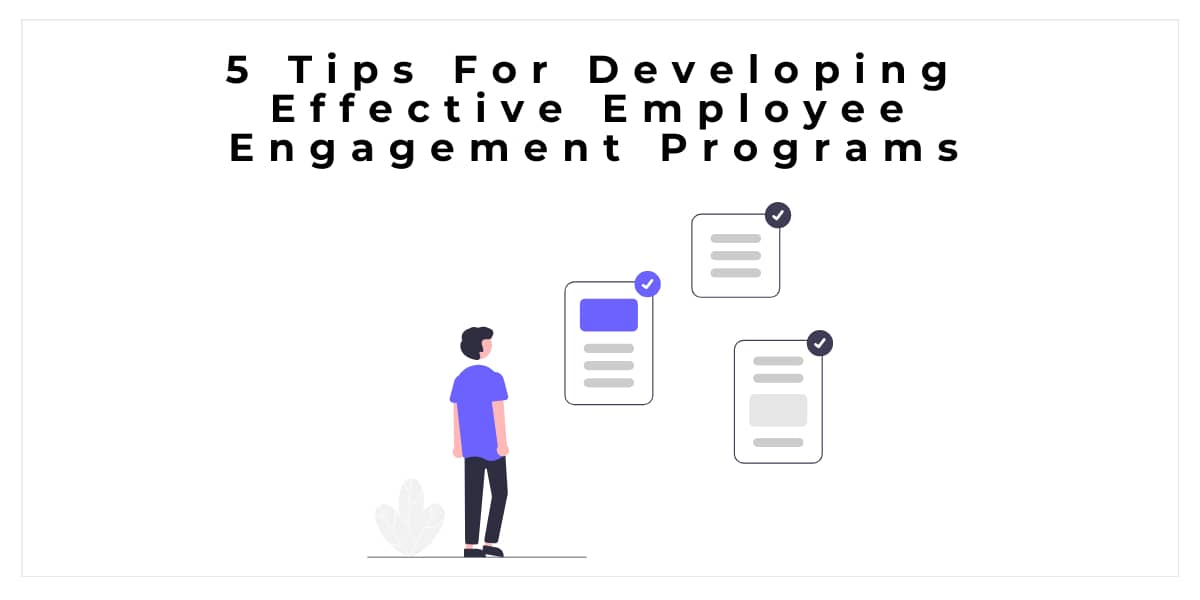Are you looking for a way to increase employee engagement within your organization? Have you been searching for five tips that will help create an effective program and solidify the success of your workforce? If so, then this blog post is perfect for you! Here, we’ll provide five actionable strategies your organization can adopt to strengthen employee engagement, improve productivity, and drive meaningful results. We know how important it is to ensure everyone feels connected with their role while continuing to find new ways of engaging team members – let’s discuss these strategies!
Empower Employees – Make sure to give employees autonomy over their work and include them in the decision-making, so they feel empowered and valued.
Providing employees autonomy and purposeful involvement in decision-making is one of the most important ways to foster an engaged and motivated workforce. When employees feel that their contributions are valued, they take pride in their work and are more likely to contribute their ideas enthusiastically. This can help create a dynamic team environment that supports successful outcomes for the organization. Empowering employees increases job satisfaction and aids in employee retention, as workers recognize the value of their contributions to the employer. A strong focus on empowering employees through a balanced mix of structure and freedom can help ensure a consistent, successful workflow in an organization's plans. Another way to empower your employees is through online training, such as cyber security employee training.
Prioritize Employee Needs – Make sure you identify the needs and wants of your employees first before creating a program. This will help you create a program that meets everyone's needs.
One of the most essential steps in creating an effective employment engagement program is prioritizing employee needs before developing a plan. Researching and getting feedback from staff members can help determine what’s important and how to structure the program for success. Different employee demographics, roles, and responsibilities may have different needs. One should consider that. Additionally, employees are more likely to actively participate when they feel their values are recognized and their suggestions factored in. Moreover, prioritizing employee health and safety within the workplace demonstrates a commitment to employee well-being, enhances the overall safety culture, and ultimately contributes to the organization's success. Investing in safety training like the CPR and first aid Edmonton is not just about compliance but about creating a resilient, confident, and prepared workforce. Therefore, understanding the wants and needs of your workforce ahead of time can be beneficial in implementing successful employment engagement initiatives.
Create Opportunities for Collaboration – Allow employees to collaborate on projects, brainstorm ideas, and develop creative solutions.
One key component of developing effective employee engagement programs is creating opportunities for collaboration and team-building. You can achieve this with fun in-house activities like charades or exciting virtual events such as escape rooms hosted by Escapely. When teams work together on interactive exercises, it helps increase employee engagement and boosts morale and productivity. Allowing your employees to work collaboratively can help foster a sense of camaraderie among coworkers, leading to better communication and improved relationships both in the workplace and outside of it. Collaborative projects and activities are an effective way to engage employees, keep them motivated, and boost overall job satisfaction at the same time.
Encourage Flexibility – Consider giving employees more freedom in structuring their workdays and other advantages like remote working options, if possible.
Employee flexibility is key to developing effective engagement programs. Allowing employees more freedom in planning their workdays can create a better balance for them and their goals. This can be anything from offering flexible work hours, scheduling their lunch break earlier or later, or even providing remote working options, if possible. This empowers the employee to take ownership of their day, prioritize important tasks, and feel accomplished at the end of the day. Encouraging flexibility in the workplace can improve employee productivity, satisfaction, and engagement in the long run.
Recognize Achievements - Show your appreciation for hard work by recognizing individual or team achievements with rewards such as bonuses or promotions.
A successful employee engagement program should include the recognition of individual and collective accomplishments. Recognizing the efforts of hard-working employees through monetary bonuses or promotions is crucial. By rewarding employees who achieve results, you show appreciation for their work and motivate them to continue performing at high levels. This is an effective way to boost morale and ensure that all team members are driven to succeed. Additionally, giving rewards, such as those offered by awards.com, can foster a stronger bond between colleagues, as they encourage one another and promote a productive work environment with shared pride for success.
Creating an effective employee engagement program requires thoughtfulness and consideration. Your employees will drive your company’s success, so their needs must be met. Empower them to take the initiative, prioritize their needs first, create flexible opportunities for collaboration, and recognize their achievements when possible. With the right engagement program in place, you can develop a culture of collaboration and motivation throughout your organization and help drive success within your company. Taking these tips into consideration can profoundly affect the employee experience - resulting in a more satisfied and motivated workforce and positive outcomes for the business overall.








